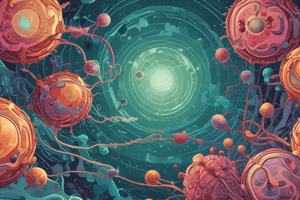Podcast
Questions and Answers
What are the four different types of tissues in animals?
What are the four different types of tissues in animals?
Connective, muscle, nervous, epithelial
What type of tissue is primarily responsible for muscle contraction?
What type of tissue is primarily responsible for muscle contraction?
Muscle tissue
Which muscle type is found in the heart?
Which muscle type is found in the heart?
- Skeletal muscle
- Cardiac muscle (correct)
- Smooth muscle
- Striated muscle
Nervous tissue is made up of only neurons.
Nervous tissue is made up of only neurons.
What substance insulates neurons in the nervous system?
What substance insulates neurons in the nervous system?
Which type of stem cells are most versatile?
Which type of stem cells are most versatile?
Match the following terms with their definitions:
Match the following terms with their definitions:
What is the process called when stem cells can produce daughter cells that remain as stem cells?
What is the process called when stem cells can produce daughter cells that remain as stem cells?
Hematopoietic stem cells (HSCs) can renew themselves.
Hematopoietic stem cells (HSCs) can renew themselves.
What are the two groups into which progenitor cells can be divided?
What are the two groups into which progenitor cells can be divided?
Flashcards are hidden until you start studying
Study Notes
Overview of Tissues and Organs
- Organs consist of various tissue types, such as muscle, fibrous, and specialized cells.
- Four animal tissue types: connective, muscle, nervous, and epithelial.
- Plant tissues are categorized into vascular, ground, and epidermal.
- Tissues work collectively to perform specific functions in organs like the brain and heart.
Types of Animal Muscle Tissue
- Muscle tissue is essential for movement and contraction.
- Three muscle types:
- Skeletal Muscle: Attaches tendons to bones, enabling voluntary movement.
- Cardiac Muscle: Located in the heart, responsible for pumping blood.
- Smooth Muscle: Found in organs like intestines and blood vessels, facilitates involuntary movements such as digestion.
Nervous Tissue
- Composed of neurons and neuroglia; integral to the nervous system.
- Divided into gray matter (unmyelinated axons) and white matter (myelinated axons).
- Myelin is crucial for efficient nerve impulse transmission.
Stem Cells Overview
- Stem cells can differentiate into various cell types (e.g., blood, skin, nerve).
- Types include:
- Embryonic Stem Cells: Most versatile, derived from blastocyst, pluripotent.
- Adult Stem Cells: More specialized, produce specific tissue cells; also known as tissue-specific stem cells.
- Totipotent Stem Cells: Can develop into any cell type for a complete organism.
- Multipotent Stem Cells: Limited differentiation potential.
- Unipotent Stem Cells: Can only differentiate into one specific cell type.
Stem Cell Division and Differentiation
- Hematopoietic Stem Cells (HSCs) are self-renewing; daughter cells can remain as HSCs through asymmetric division.
- Progenitor cells, derived from HSCs, cannot self-renew but develop into specific blood cell types.
- Two HSC groups exist:
- Long-term Self-renewing HSCs: Maintain a stable stem cell pool.
- Short-term Self-renewing HSCs: Have limited self-renewal capability.
Cellular Differentiation Process
- As stem cells mature, gene expression changes restrict potential cell types.
- Maturation leads towards a specific cell type, commonly tracked by surface proteins indicative of differentiation.
- Mesenchymal Stem Cells (MSCs) and HSCs play a vital role in bone marrow, producing various blood cell types.
Studying That Suits You
Use AI to generate personalized quizzes and flashcards to suit your learning preferences.




